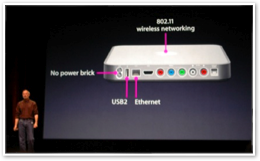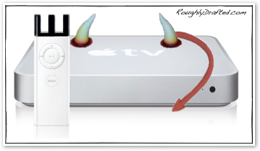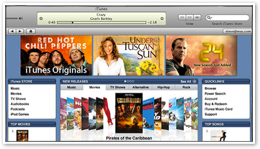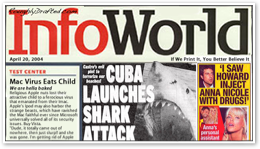


In this week's Fortune magazine, Brent Schlender giddily attacked Apple TV, calling it a dud similar to Microsoft's Zune. Back in September, I began writing about Apple TV and the potential it presented, even calling it the reason “Why Apple Will Change TV.” Clearly we have different views on the subject; let's look at the details and see who is more likely to be correct.
First Impressions of Apple TV.
The day it was revealed, I noticed two details that seemed important--apart from the fact that it was introduced by the same company that launched iTunes and the iPod:
-
•an emphasis on wireless connectivity
-
•inclusion of HDMI
I immediately suggested that the reason why Apple “very uncharacteristically announced plans for a product that won't be available for possibly another six months” was related to wireless capacity. “Apple's new iTV is being held up, I believe, because Apple is waiting to deliver 802.11n, the next major jump in wireless networking.”
That article also pointed out that “Apple outfitted the new device with HDMI and component video. If all the iTV could do was 640 x 480 iTMS video, Apple would have simply used a VGA adapter or super video connector, just like the existing iPod dock. It is quite obviously designed to play HD content. Apple even demonstrated the iTV playing back HD content.”

Why announce it early? “Apple announced the iTV so that users would know Apple has a strategy for delivering wireless content at a higher quality than existing systems. That's the most roadmap information Apple has provided in the consumer space in a while, and is a welcomed change.”
What I Got Wrong.
I didn't get everything right however. I also wrote: “This isn't a Mac. There isn't room for an optical drive [... or] a general purpose Intel Core processor and necessary cooling, or other typical PC hardware. [...] This is an appliance, the video Airport Express: it lacks everything else. It has no dedicated display, and no user interface beyond the simple TiVo-like Front Row.”
 As it turned out, Apple TV very much was a Mac; while it doesn't have an optical drive nor a Core processor, it does have a limited Intel Dothan variant, which enables it to run the full Mac OS X, including the Front Row-like interface. I also erred in suggesting Apple would include Gigabit Ethernet in an illustration.
As it turned out, Apple TV very much was a Mac; while it doesn't have an optical drive nor a Core processor, it does have a limited Intel Dothan variant, which enables it to run the full Mac OS X, including the Front Row-like interface. I also erred in suggesting Apple would include Gigabit Ethernet in an illustration. Running with Facts.
What was the basis for the promising prospects I gave Apple TV, then known under the code name iTV?
Value-Engineered Price: "That's why the iTV will be much more like an upscaled iPod than a downscaled PC. Microsoft has been trying to resell the PC in the form of MSN TV and the Windows Media Center and is simply not doing so well with that strategy.
“The most obvious advantage this gives Apple is a much lower price point. It's rather hard to scale a standard PC down to $299 while providing HD video and optical digital audio outputs. By targeting the iTV directly at its intended purpose rather than lobbing a PC at every problem, Apple ends up with a product that sells itself.”
Solution-Centric Innovation: “This is another example of how Apple competes as a technology company: it finds what users need, then engineers a product designed to meet those needs, often in innovative ways. Apple's approach can be seen in the design of the iPod, but also in software, from its iLife apps to pro apps such as Aperture.”
“There's simply not much point in trying to mimic successful, established products unless it's possible to effectively compete on price. In order to deliver sales, a new product has to add significant new value. If the value is already being delivered, where's the opportunity?”
Game-Changing Strategy: “There are five areas where the iTV can add value for users in ways that existing products haven't. Rather than trying to be everything to everyone, Apple has clearly targeted markets that represent low hanging fruit waiting to be picked.
“In its first year of iTV, Apple isn't going to deliver a magical $299 box that replaces the Tivo, Media Center and other DVRs; Netflix , other DVDs rentals, and DVD sales; broadcast TV; or the Xbox, PlayStation, and Wii.
, other DVDs rentals, and DVD sales; broadcast TV; or the Xbox, PlayStation, and Wii.
“Apple doesn't need to “kill” any of those products in order to be wildly successful. In fact, iTV will offer the most value to consumers by integrating well with the products they already use.”
Five Reasons Apple Will Change TV.
Apple delivered the first two immediately: hundreds of movies and music videos to download and thousands of podcasts, plus the ability to watch iPhotos and home movies on TV without having to think about how. To deliver alternative content, Apple recently announced a partnership with Google to put YouTube videos on Apple TV.
How far away are Apple TV games and edutainment, and new content commissioned for Apple TV? What’s interesting is that even if Apple were to vanish tomorrow, third parties could deliver these features themselves.
Et Tu, YouTube?
It appears that Apple's YouTube support is pushing Google to move from distributing its videos from the existing Flash video and “GVI” format (which is nearly identical to DivX/AVI) to standard MPEG-4 H.264. That's good news for mobile devices of all types, and will make a big splash in the online pool for supporting H.264 as a standard.
Since Apple TV is optimized for H.264 decoding using its hardware graphics coprocessor, this will make Apple TV an ideal way to watch Google’s YouTube videos, along with the other video archives Google curates. Video iPods and the iPhone are also optimized for H.264.
That means that as Google helps to pioneer standards-based video distribution, Apple will continue to pioneer MPEG-4 playback.
Will the two collaborate further on back-end QuickTime video distribution technologies, improved podcast feeds for Google videos, and an iPhone client to YouTube? It would be hard to suggest why the two tightly aligned companies would not.
And What About HD?
Today’s world of HD video involves layers of sophisticated DRM that attempt to prevent users from recording or sampling video in any form. That's why Windows Vista--which provided early support for HD video--was harshly lambasted with complaints over DRM. It's not that Microsoft is embedding some new set of restrictions on users, but rather a case of Microsoft supporting the DRM demanded by the HD-DVD and Blu-Ray camps.
For Apple to deliver Blu-Ray or HD-DVD, it would have to import all of the same restrictions and limitations in Mac OS X. It's not yet clear that people want HD at that cost... although it’s also not popular to say that yet.
Risking the angry rage of George Ou, who comically insists that HD video really isn’t HD video unless enough bits are wasted, I’ll project that HD discs are unlikely to take the world by storm in the way DVD did.
DVD took off rapidly because it offered a convenient CD form factor with much better video quality than VHS tapes. There were really no other options. China began work on its own DVD rival to avoid having to pay the DVD Consortium for its patent pool, but nothing competed against DVDs in the West.
Is Apple the Dark Horse of HD?
It appears Apple is positioning its iTunes online video store as an alternative to buying every new movie again on HD disc. That puts iTunes in the position of a third candidate in the rivalry between HD-DVD and Blu-Ray.
For the few million users who have already bought into HD discs like Ou, iTunes video won't be a competitive distraction. However, for the hundreds of millions of DVD users who will be considering the purchase of new flat panel TV display in the next couple years, Apple TV promises to offer an easy way to download HD movies at a much lower cost, along with everything else it already does.
Of course, Apple isn’t offering HD content yet. The key factor is that Apple TV is built to deliver it. As with the iPod, Apple TV can already play ripped DVD movies for high quality playback with surround sound. That positions Apple over the sweet spot of the market, because more people are willing to consider a $300 box that plays $10 movies over a $600 box that plays $30 movies.

The Uncertain Race Between HD and DVD.
While HD discs will quickly find buyers like Ou on the high end, there are several reasons why HD disc formats are unlikely to rapidly displace DVD.
Good Enough: The first is that DVD doesn't need replacing the way VHS did. VHS was always considered fair to poor quality, but it hung around because there were no adequate replacements for rental video stores and a very limited retail movie market. Laserdisc offered much better quality, but was too expensive and scant for most users to consider.
Today however, consumers have to consider whether buying an expensive new setup really delivers an incredible new jump in quality. For users that already have it, HD is great. It is not a mass market phenomenon though. Earlier attempts to deliver HD audio to replace CDs similarly tanked with DVD-Audio and SACD.
The Long Haul: The second reason why HD discs are unlikely to rapidly replace DVD is that DVD itself took a decade to replace VHS as the most popular format. Even if HD discs expanded in popularity faster than DVD, the existing format will be around for a long time.
Format Uncertainty: Confounding that is that thirdly, HD discs are split between two camps. That creates some market uncertainty, and keeps mainstream buyers from rushing to adopt either. Until multiple format players become common, HD won't become mainstream. When it does, half of the HD disc market will collapse holding the shorter stick.
Price Premium: Lastly, HD discs and their players are still quite expensive. Together, all of those factors paint a picture of DVD being the common denominator for several more years.
That gives Apple a perfect window of opportunity to establish iTunes and Apple TV as an alternative to HD discs. Apple offers no outrageous DRM that attempts to block playback on analog displays, much lower prices, and the ability to ramp up quality over time.
Apple has boosted iTunes video quality every year, so expecting today's video quality to suddenly remain stagnant is simply absurd. Apple is limited only by Internet distribution speeds, not by the size of a disc.
Schlender's List.
That all seems to paint a picture of Apple TV being a future proof device with none of the VHS/Betamax format risk inherent in today's HD discs, integrated into a system that already works well for hundreds of millions of iTunes users, with future potential readily unlocked by software updates, because Apple TV is a Mac.
Apple has regularly updated iTunes and iPods, and promised to update the Apple TV back in April. It just recently made some specific comments on what those updates will be, including the new YouTube support.
So why did Fortune publish an article calling the Apple TV a dud? Perhaps it was desperate bid for attention. Schlender, Fortune's editor-at-large, had to turn back the clock to the 1980s to support his idea that “Steve Jobs might be promising more than he can deliver.”
He brought up the Apple III and the Lisa, then said Job's NeXT Computer couldn't find a market. Perhaps Schlender should investigate the medium he's being published on, since the web was invented on a NeXT Cube, and the company was sold to Apple for half a billion dollars after a decade of groundbreaking work.
That’s some fancy dud.
Schlender also complains about the 2001 Power Mac Cube. Did Apple lose money on the Cube? The US economy was tanking in the year it was introduced and Apple lost money in the final quarter of 2001, but calling the Cube a failure is a bit of a stretch.
Fortune: It's just not very good.
But who needs insightful criticism when you can just throw out conjecture and get Fortune to pay for it? Moving on to Apple TV, Schlender says, “You don't see many ads for it on TV.” That’s wrong; Apple is advertising it in conjunction with iTunes and the iPod as a way to watch the same content from the PC to the iPod to the TV.
What is wrong with Apple TV? Schlender says, “It's just not very good. It's about as uninspired as another prominent dud, the Zune, the MP3 player Microsoft launched last year.”
Schlender even speculates that Apple handed off Apple TV development to “the folks up in Redmond” while focusing on the iPhone. Haha, funny stuff! But exactly how is Apple TV like the Zune?
-
•Is it shoddily built from cheap plastic in a big clunky box?
-
•Does it only work with a new, beta quality management application?
-
•Does it fail to play the majority of media available?
-
•Does it push users into signing a subscription contract?
-
•Does it stuff in useless features nobody needs?
-
•Does it just rebrand an existing failure in the market with new marketing?
-
•Does it over-promise and under-deliver in epic ways?
What are the similarities, Schlender? Go ahead, I’m familiar with the Zune’s problems.
Zune-Like?
“It requires an HDTV, but the video you download is so low-res that it looks as fuzzy as plain old broadcast TV.” Oh good observation! Standard definition video is standard definition! Of course, the Apple TV doesn't actually require HDTV, but it does demand an EDTV or TV with component inputs. Nor does Apple promise HDTV video from iTunes, but rather calls it “near DVD quality.”
Standard definition iTunes video and DVDs might look pixelated on HDTVs, but are certainly not fuzzy.
Schlender says the Apple TV's hardware support for future HD content is like the Zune's WiFi, which is only used to send song advertisements that spontaneously destroy after three plays. But no, it isn't at all like that at all. If the Zune offered the future potential to be used as an IP phone or a web browser, it might be similar to the Apple TV. But does not offer dormant future potential, it only offered intentionally crippled features.
WTF, Fortune Published This? How Embarrassing.
“Apple TV's coolest feature is one that wasn't even intended: the screensaver,” Schlender continues. Wait, I'm pretty sure Apple intended it, since the company built it. What's cool about it is that it's a practical application of Apple's core technologies. Schlender doesn't seem to understand that either.
“There's no way to order a movie directly from the iTunes store via your TV,” he complains. The Zune doesn't do this using its WiFi either he says. Of course, neither will the iPhone. Maybe building a purchasing client into a handheld isn't a good idea.
I wrote before why I think the shopping client belongs in iTunes, with the technical rational why. Maybe there’s a good reason there’s no steering wheel in the back seat of your car, too, even if you think there should be.
“Apple TV lets you show photos only from a single computer, even though photos are the one source of HD content everyone has, and are easy and legal to share over a network.” Of course, the reason for this is that Apple TV has to cache the photo library locally. Will Apple expand upon Apple TV's photo software in the future? I would hope so, but how many different iPhoto libraries does the typical home have?
He Keeps Going...
Schlender compares this to the fact that the Zune broke all compatibility with Microsoft's earlier PlaysForSure partners. Does anyone vet Schlender's articles? Has Fortune given up on fact checking and on demanding basic technical skills of its columnists in the mad rush to entertain the hordes of Digg with sensationalist headlines?
Schlender goes on to say that “Apple TV doesn't have a DVD drive or a volume control on its minimalist remote or ... but enough.” No actually that's not enough! The Apple remote does have a volume control, but how should Apple TV adjust the volume that's coming out of your TV or stereo system?
After rambling on for multiple paragraphs and saying nothing apart from the fact that iTunes doesn't yet offer or advertise HD content, Schlender then jumps on the idea that the iPhone will be similarly disappointing.
Schlender seems to be chasing after Dvorak and Thurrott in the rush to become the next cranky geek, calling himself the “Grouchy Geek.” Wow, that's original! But is the world in dire need of more uninformed speculation being passed off as intelligent discourse by purported news sources? And shouldn't age result in wisdom?
What If Apple TV were Designed by Microsoft?
We already know that an Apple TV designed by Microsoft would be the Media Center, because we already watched it parade out and die a bitter, lonely death on the consumer battlefield.
But imagine if Apple had secretly pawned off development of Apple TV to Microsoft's consumer products division. What would it look like?
-
•Big and heavy and loud like the Xbox 360
-
•Optimized for proprietary Windows Video codecs rather than open MPEG-4 H.264
-
•No HDMI port unless you buy the more expensive Elite model
-
•Software boot image locked in firmware like the 360 and Zune
-
•Subscription based LIVE! service to drive profits
-
•Available in Brown
The Future of Apple TV.
Apple TV does need some updates, but those are easy to deliver. Had Apple hamstrung the device’s hardware in stupid ways, it might have been dud-worthy.
In reality however, Apple TV is an expertly designed, low power computer with the potential to deliver very high quality content. Like the iPod, it can present video purchased from iTunes as well as video from other sources: DVD with a rip, home camcorders, podcasts, and soon, YouTube.


It's all funny to suggest as a laugh that Apple TV is better suited as a sushi platter--haha--but if you're writing for Fortune, you probably should work harder at presenting real world information that benefits your readers, rather than trying to emulate the FUD baiting of other haha-I'm-old-and-cranky tech anti-luminaries who have already worn out their niche and saturated the net with insipid blather that doesn't matter to anyone beyond yesterday’s popularity counters who revel in any tidbits of anti-Apple conjecture.
It’s an embarrassment for journalism when professional writers fail to take their jobs seriously. Fortunately, the rest of the world yet hasn’t joined Fortune/CNN, IDG, ZD/CNET, and Engadget in handing readers wooden nickels good only for a half-wit giggle on Digg. Unfortunately, those properties make up a large part of the web’s news.
Money Talks.
The Canadian National Post writes that Deutche Bank analysts are forecasting that Apple “will eat up a good chunk of the US$26-billion DVD player market in the next several years.”
Deutche Bank also stated, “Apple is positioned to introduce a compelling integrated home media infrastructure solution,” and set a $140 price target for Apple stock.
Perhaps Apple will change TV after all. Too bad Fortune readers won't see it coming.
Like reading RoughlyDrafted? Share articles with your friends, link from your blog, and subscribe to my podcast!
Did I miss any details?
Next Articles:
This Series

Haloscan Q107
Brent Schlender's Apple TV: Fortune Dud or Fortune FUD?
Saturday, June 2, 2007

Ad
















 Bookmark on Del.icio.us
Bookmark on Del.icio.us Discuss on Reddit
Discuss on Reddit Critically review on NewsTrust
Critically review on NewsTrust Forward to Friends
Forward to Friends
 Get RSS Feed
Get RSS Feed Download RSS Widget
Download RSS Widget





